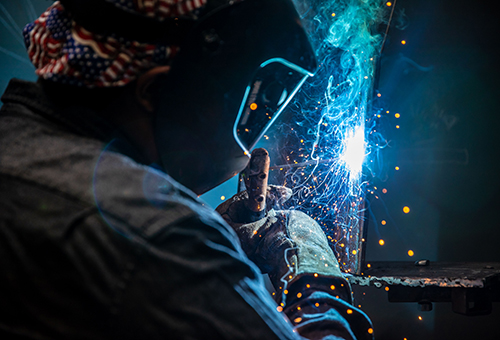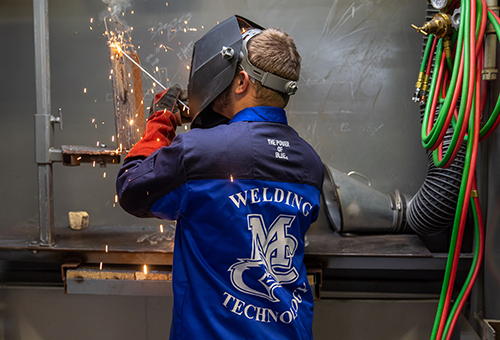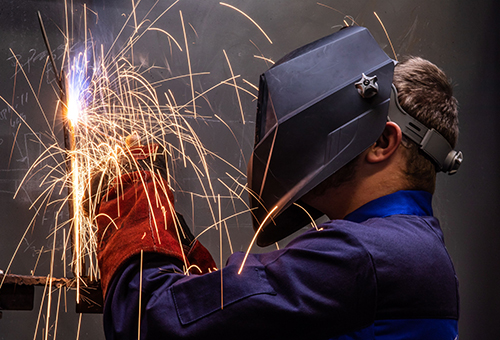Welding Technology
Welding is a process for permanently joining metals together using an electric arc to melt a filler-metal into the original metal. Quite simply – the process makes two pieces of metal into one.
A welder may also cut, contour and bevel metal plates and structural shapes into dimensions as specified by blueprints, work orders, and templates using torches, saws, shears, or other machine tools. Welding takes the skill and talent of an artist acquired through training and discipline.
 |
 |
 |
Program Details
Select links below for details
At Midland College, an Associate of Applied Science for Welding Technology prepares you to pursue a career in welding fabrication, welding manufacturing, and/or welding repair. In addition, MC offers one of the best-equipped welding training facilities in the region. Students explore many facets of welding technology and gain access to career paths from manufacturing and industry to inspection and management.
The MC welding curriculum is designed to develop skills, attitudes, and competencies in welding processes including oxy-fuel welding and cutting, gas metal arc welding, gas tungsten arc welding, and shielded metal arc welding. In addition, students will receive training in welding safety, blueprint reading, metallurgy, and layout and fabrication.
Our program offers the following:
- A curriculum designed to meet the needs of the welding industry.
- Instruction for all positions on carbon and stainless steel plate and pipe, using the following multiple processes: Shielded Metal Arc Welding (SMAW) “Stick,” Gas Metal Arc Welding (GMAW) “MIG,” Gas Tungsten Arc Welding (GTAW) “TIG,” and Flux Cored Arc Welding (FCAW) processes, plus Oxy-Fuels.
- Certificates and continuing education courses for students who want to go directly into the workforce.
- An Associate of Applied Science (AAS) degree with academic courses that allow a well-rounded individual to meet the needs of industry and pursue career opportunities.
Marketable Skills
Pursuing a Welding certificate or degree will provide marketable skills in these areas:
- Repairing – Repairing machines or systems using the right tools
- Operation Monitoring – Watching gauges, dials, or display screens to make sure a machine is working
- Troubleshooting – Figuring out what is causing equipment, machines, wiring, or computer programs to not work
- Critical Thinking – Thinking about the pros and cons of different ways to solve a problem
- Equipment Selection – Deciding what kind of tools and equipment are needed to do a job
Career Opportunities
There are a number of in-demand career possibilities in:
- Manufacturing
- Construction
- Energy Production/Transport
- Inspection
- Engineering
- Robotics
- Education
- Project Management
- Sales
Demand
In Texas, industries and communities are growing, especially in the petrochemical areas. As construction rates rise, so does the demand for talented welders. The U.S. Bureau of Labor Statistics (BLS) says the employment of welders, cutters, solderers, and brazers is projected to grow 6% from 2016 to 2026.
To be considered for a scholarship, please follow the link below:
Visit the course catalog for the most complete and up-to-date information.
Why study Welding Technology at MC?
Workforce Solutions (WIOA) Eligible
Students choosing this academic pathway may receive funding and other financial assistance and support from Workforce Solutions. See www.facebook.com/PermianBasinWorkforce, call (432) 367-1449 (option 5), or open the flyer for information on the services they provide in partnership with Midland College. The Workforce Solutions office is located on Midland College's main campus, in room 138 of the Technology Center (TC) Building. Note: Students receiving federal and state financial aid are not eligible for WIOA assistance.
ContactDepartment ChairYesenia MartinezWelding and Computer Aided Drafting and Design (CADD) Technology Center, Room 189A (432) 681-6348 ymartinez@midland.edu |
Division OfficeApplied TechnologyMarie Hall Academic Building |
Related Programs |
Related Resources |
Apply to MC Now
Thank you for choosing Midland College! If you are here to collect a few credits, take courses to transfer, or here to start a new career, we welcome you.